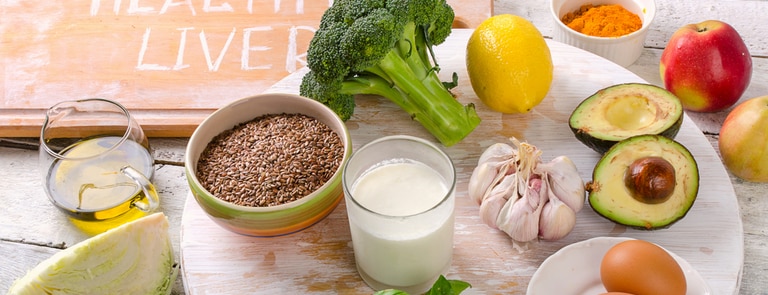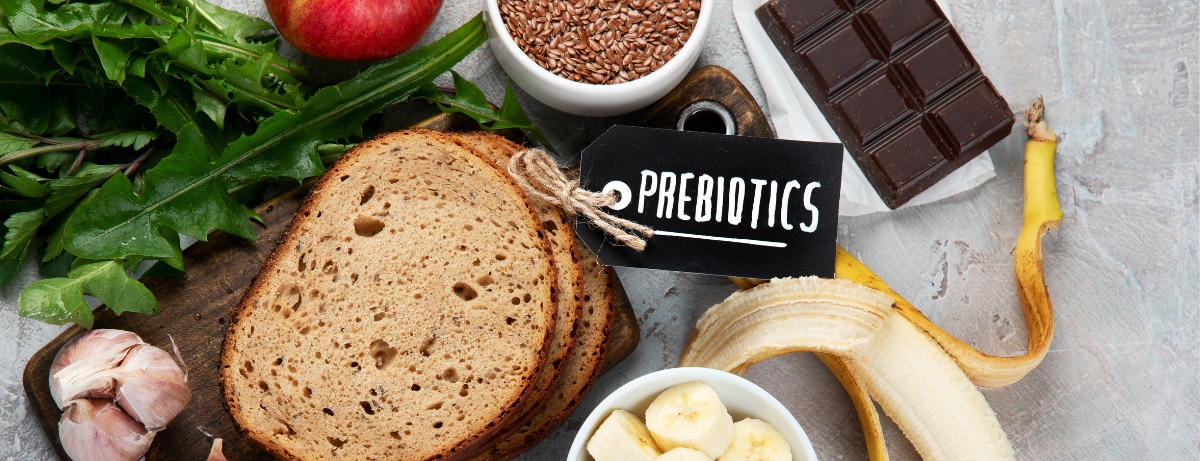20% off €40
How to take care of your liver

Your liver performs a dizzying range of important jobs: breaking down food and turning it into energy, storing vitamins, regulating hormones, fighting infection, and – perhaps most famously – filtering out toxins.
How does the liver get rid of waste?
There are two phases of detoxification.
In the first, enzymes (called cytochrome p450) help convert toxins, such as alcohol or caffeine, into intermediary compounds.
In stage two, these compounds become water-soluble so they can be excreted as waste via the kidneys and bowel.1
While it’s remarkably resilient, ‘toxic overload’ can still push the liver to its limits.
The British Liver Trust says one in five of us are at risk of liver damage, suggesting we should look after them better.2
Consistently drinking over recommended alcohol limits (14 units a week for both men and women, spread out over three or more days) can lead to liver scarring or cirrhosis.3
And a high-fat diet and sedentary lifestyle can lead to non-alcoholic fatty liver disease.
Handpicked content: Signs you might be drinking too much alcohol
What are the different types of liver disease?
There are several conditions that can affect the liver and lead to scarring (cirrhosis), including:
- Alcohol-related liver disease - Caused by long-term alcohol misuse.
- Non-alcoholic fatty liver disease - Most often seen in overweight or obese people, this is the result of a build-up of fat.
- Haemochromatosis - An inherited disorder where iron slowly builds up around the liver.
- Hepatitis - Swelling of the liver triggered by exposure to harmful substances or viruses.
Supplements and foods to support your liver
Fortunately, there are some supplements and foods that can help support your liver:
-
Artichoke for liver health
This fibrous green vegetable, a member of the thistle family, has traditionally been considered a liver-helper, and modern science appears to back these claims up.4
The active ingredients in artichoke include the antioxidants cynarian and luteolin.
One Turkish study found artichoke leaf extract helped decrease fat levels in the liver, while another in the journal Experimental and Toxicologic Pathways found pre-treatment with artichoke extract protected liver against damage from toxins.5,6
Artichoke also appears to boost bile production, which is made in the liver and aids our body’s digestion of fats.
-
Milk thistle aids liver function
The star ingredient in this age-old liver remedy is silymarin, an antioxidant-rich compound.
It’s thought silymarin may stabilise the membranes of liver cells, preventing the entry of toxins.
Taking milk thistle may help reduce fat accumulating in the liver, according to one 2014 study published in the World Journal of Hepatology.7
Handpicked content: Best milk thistle supplements
-
Peppers to pep up your liver
Capsaicin is the active compound in chilli peppers that make them taste spicy.
Research announced at the International Liver Congress in 2015 found regular consumption may have a beneficial effect on liver damage.8
You can find capsaicin in fresh chillies, or try taking cayenne supplements.
-
Curcumin helps prevent liver damage
It gives turmeric and curries their bright yellow colour, but this antioxidant pigment could help reduce liver damage as well.
A joint 2010 study between Austrian and Texan researchers found that curcumin reduced scarring in the liver, and signs of jaundice, although more research is needed to work out its exact effects.9
-
Oily fish
Salmon, herring and mackerel are rich sources of omega-3 fatty acids EPA and DHA which could help reduce fat in the liver.
In a study based on 50 overweight children with non-alcoholic fatty liver disease, those that took supplements containing DHA lost belly fat, fat around the heart and reduced just over half of their liver fat.10
If you are unable to source omega-3 from your diet, you benefit from taking an omega-3 supplement.
Handpicked content: 10 of the best omega-3 & fish oil supplements
Turmeric
Renowned for its anti-inflammatory properties, turmeric is a common ingredient in curries.
Its main ingredient is curcumin which evidence suggests could help prevent scarring of the liver by protecting the flow of bile which breaks down fat.11
But this member of the ginger family doesn’t just belong in your favourite curry, why not sprinkle it on rice, add it to soup, or even blend it into smoothies?
Handpicked content: 10 science backed turmeric benefits & uses
-
Garlic
With its strong smell and aromatic flavour, garlic is a staple in many home-cooked recipes.
Research shows that as well as having beneficial effects against cardiovascular disease, colds and cholesterol, garlic could also protect the liver from harmful toxins.
Spice up soups and casseroles or roast it slowly for a more mellow taste.
If you want to look after your liver, a diet full of liver-friendly vitamins and minerals along with controlling your consumption of alcohol, processed food and saturated fat could help stop any damage in its tracks.
-
Avocado
You might know it as a vegetable, but the main ingredient in guacamole is actually a fruit.
Researchers in Japan have revealed that avocados contain substances that could help reduce liver damage.12
In addition, the avocado’s creamy flesh is also packed with essential minerals and nutrients such as potassium, vitamin E and magnesium.
-
Eggs
Loaded with protein, iron and B vitamins, it’s easy to see why eggs are a nutritional powerhouse.
But served boiled, poached or scrambled, the humble egg is also a good source of choline.
Choline is a vitamin that contributes to normal liver function and is also found in scallops, chicken and poultry.
Even though eggs contain cholesterol, if you’re eating a balanced diet there is no need to cut down on eggs unless you’ve been advised to by your GP.
-
Friendly bacteria to the rescue
‘Good’ bacteria have been shown to help many digestive conditions including irritable bowel syndrome (IBS), diarrhoea, or an upset stomach.
Now evidence shows they could be good for your liver too.
Researchers from Johns Hopkins University in the US discovered in a lab study that friendly bacteria can calm liver inflammation and improve symptoms of non-alcoholic fatty liver disease.13
A 2014 review of friendly bacteria’s effect on liver health, carried out by the Liver Unit at the Royal Derby Hospital, found their beneficial effects ‘extends to liver function in cirrhosis, non-alcoholic and alcoholic fatty liver disease’, but concluded that larger clinical studies were needed.14
Handpicked content: Friendly gut bacteria explained
How to support your liver
There are a number of healthy habits you can adopt today to help support a healthy liver.
-
Cut down on the drinking
Too much booze is a major cause of liver disease.
Regularly drinking over the recommended amount – 14 units a week for men and women – can cause liver damage, which can lead to alcohol-related liver disease and liver cancer.15
Our livers treat alcohol just like a poison; it can process a small amount but when you overwhelm it, levels start to build up and cause damage to the liver, such as cirrhosis.
Cirrhosis is major scarring of the liver, caused by long-term damage. The scar tissue then stops your liver working properly, leading to liver failure.16
To stop this happening, don’t binge on all your weekly units at once and go alcohol-free for at least 48 hours every week.17
-
Keep an eye on your waistline
Obesity is another major cause of liver disease.18
Being overweight or obese can cause fat to build up in the liver, triggering non-alcoholic fatty liver disease (NAFLD). NAFLD can then develop into cirrhosis.19
Cut down on any unhealthy foods, like junk food or sugary treats, make sure you’re eating a liver-friendly diet (see below), and take up regular exercise – losing more than 10% of your body weight can help remove fat from your liver, reducing your risk of NAFLD.20
Handpicked content: 19 easy ways to fit exercise into your daily routine
-
Up your intake of liver-supporting foods
Everyone should follow a healthy, balanced diet, but some specific foods can be good for supporting liver function.
Cruciferous vegetables, such as broccoli and Brussels sprouts, contain compounds called glucosinolates that have been found to have a protective effect on liver cells.21,22
A study published in the Journal of Food Science in 2011 discovered that glucosinolates were still effective on liver cells even after cooking.23
A 2014 Mexican review of studies concluded that some fruits such as grapefruit, cranberries and grapes could help prevent damage to the liver, while a lab study published in the Journal of Parenteral and Enteral Nutrition in 2005 found a high-fibre diet could ‘significantly reverse the effects of fatty liver’.24,25
-
Don’t put yourself at risk
Hepatitis is one of the major threats to a healthy liver.
Hepatitis A is normally transmitted via infected food or water; you’re more likely to catch it if you go travelling to areas with a high rate of infection but it tends to clear up by itself.26
Hepatitis B and C are much more serious and if left untreated, can cause serious liver damage.
They are passed on through blood and bodily fluids, so don’t share razors or toothbrushes, always use a condom, only go to registered tattoo parlours, and check any dental work you have done abroad uses sterilised equipment.27
-
Reduce your stress levels
Stressed? It’s not just your work-life balance that suffers.
Researchers from the University of Edinburgh carried out a 10-year study to look at the link between psychological wellbeing and liver failure.
They found that those suffering from severe stress, anxiety and depression were more likely to develop a fatal liver disease.28
Taking up yoga, mindfulness or talking to a counsellor can all help reduce your stress levels – and the stress on your liver.
Handpicked content: Stress relief: How to tackle stres
Last updated: 17 September 2021
- https://askthescientists.com/qa/liver-detoxification-pathways/
- https://www.britishlivertrust.org.uk/liver-information/
- https://www.nhs.uk/conditions/alcohol-related-liver-disease-arld/
- https://link.springer.com/article/10.1007/s11130-015-0503-8
- https://www.ncbi.nlm.nih.gov/pubmed/19652921
- https://www.sciencedirect.com/science/article/pii/S0940299308000894
- https://www.ncbi.nlm.nih.gov/pmc/articles/PMC3612568/
- https://www.sciencedaily.com/releases/2015/04/150423085442.htm
- https://www.nhs.uk/news/food-and-diet/can-curcumin-slow-liver-disease/
- https://www.ncbi.nlm.nih.gov/pubmed/28040302
- https://www.ncbi.nlm.nih.gov/pubmed/18705752
- https://www.sciencedaily.com/releases/2000/12/001219074822.htm
- https://www.ncbi.nlm.nih.gov/pubmed/12540784
- https://www.hindawi.com/journals/tswj/2014/874768/
- https://www.britishlivertrust.org.uk/liver-information/looking-after-your-liver/alcohol/
- https://www.nhs.uk/conditions/cirrhosis/
- https://www.britishlivertrust.org.uk/liver-information/looking-after-your-liver/alcohol/
- https://www.nhs.uk/conditions/liver-disease/
- https://www.nhs.uk/conditions/non-alcoholic-fatty-liver-disease/
- https://www.nhs.uk/conditions/liver-disease/
- https://www.ncbi.nlm.nih.gov/pubmed/26401074
- https://www.ncbi.nlm.nih.gov/pubmed/21535814
- https://www.ncbi.nlm.nih.gov/pubmed/21535814
- https://www.ncbi.nlm.nih.gov/pmc/articles/PMC4209543/
- https://www.ncbi.nlm.nih.gov/pubmed/16224031
- https://www.britishlivertrust.org.uk/liver-information/liver-conditions/hepatitis-a/
- https://www.britishlivertrust.org.uk/liver-information/looking-after-your-liver/viral-hepatitis/
- https://www.ed.ac.uk/news/2015/stressliver-190515



